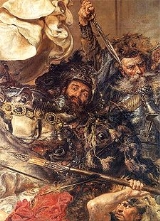
Zyndram z Maszkowic
Encyclopedia

Poland
Poland , officially the Republic of Poland , is a country in Central Europe bordered by Germany to the west; the Czech Republic and Slovakia to the south; Ukraine, Belarus and Lithuania to the east; and the Baltic Sea and Kaliningrad Oblast, a Russian exclave, to the north...
14th and 15th century knight
Knight
A knight was a member of a class of lower nobility in the High Middle Ages.By the Late Middle Ages, the rank had become associated with the ideals of chivalry, a code of conduct for the perfect courtly Christian warrior....
. His coat of arms was Słońce.
Zyndram was first mentioned in 1388 as a mayor of Jasło. He bought the post from a certain Jakusz Trzop for 100 grzywnas. He was also the Sword-bearer of the Crown. In February 1390, Zyndram took part in the military campaign against the Teutonic Order. The following year, he was yet again called to arms and took part in several battles against the Order in Lithuania and northern Poland.
Zyndram was ordered to organize the defense of a nodal castle of Kamieniec Litewski, east of the Białowieża Forest. Probably for successfully fulfilling this task, he was promoted to the starost of Jasło. In 1409, Zyndram was called to arms by king Władysław II Jagiełło to take part in his offensive against the Teutons. During the famous Battle of Grunwald
Battle of Grunwald
The Battle of Grunwald or 1st Battle of Tannenberg was fought on 15 July 1410, during the Polish–Lithuanian–Teutonic War. The alliance of the Kingdom of Poland and the Grand Duchy of Lithuania, led respectively by King Jogaila and Grand Duke Vytautas , decisively defeated the Teutonic Knights, led...
of 1410, Zyndram was the Grand Camp Leader of the Crown and commander of the Banner of Kraków, composed of elite troops and holding the banner of the whole army. According to Historiæ Polonicæ by Ioannes Longinus, it was the unit commanded by Zyndram that killed the Teutonic commander, Ulrich von Jungingen
Ulrich von Jungingen
Ulrich von Jungingen was the 26th Grand Master of the Teutonic Knights, serving from 1407 to 1410. His policy of confrontation with the Grand Duchy of Lithuania and the Kingdom of Poland sparked the Polish–Lithuanian–Teutonic War and led to disaster for the Order in the Battle of Grunwald.- Life...
. For many years, it was also believed that he was commander of all Polish troops in the battle, but recent research proved that this was but a wrong translation of Longinus' chronicle. His part in the battle was also described by Henryk Sienkiewicz
Henryk Sienkiewicz
Henryk Adam Aleksander Pius Sienkiewicz was a Polish journalist and Nobel Prize-winning novelist. A Polish szlachcic of the Oszyk coat of arms, he was one of the most popular Polish writers at the turn of the 19th and 20th centuries, and received the Nobel Prize in Literature in 1905 for his...
in his novel The Teutonic Knights.
After the campaign, Zyndram returned to his domain. In 1413, he extended his domain by renting the village of Przesiecznica from the bishop of Przemyśl
Przemysl
Przemyśl is a city in south-eastern Poland with 66,756 inhabitants, as of June 2009. In 1999, it became part of the Podkarpackie Voivodeship; it was previously the capital of Przemyśl Voivodeship....
in exchange for the defense of the area against the Tartars and bandits from the Beskides. The exact date of his death is unknown, however on June 5, 1414 his wife, Anna, was mentioned as "Widow of Zyndram".

